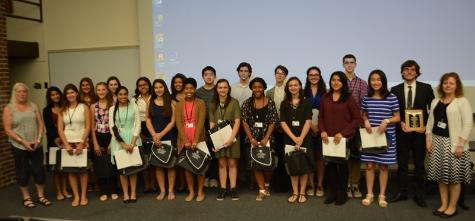
The STARs Were Bright at the Fifth Annual Student Research Forum
The Fifth Annual Summer Trainees in Academic Research (STAR) Student Research Forum hosted by the Graduate School of Basic Medical Sciences on August 11

Scientific acumen, poise and enthusiasm were the hallmarks of the Fifth Annual Summer Trainees in Academic Research (STAR) Student Research Forum hosted by the Graduate School of Basic Medical Sciences on August 11. Twenty-one high school and undergraduate students who participated in this year’s STAR program seemed wise beyond their years as they presented their research at the forum after completing their summer projects under the mentorship of an NYMC faculty member and attending special lectures and seminars. The research forum was an opportunity for the students to present their findings and enhance their science communication skills while receiving constructive feedback from faculty and graduate student judges. View the STAR research forum photo gallery here.
The day was capped off with a keynote address by Robert Bednarczyck, Ph.D. ’16, who presented “Inflammation in Breast Cancer: Friend or Foe?" Dr. Bednarczyck was an active supporter of the STAR program when he was a student at NYMC, mentoring the participants and serving as a role model for the young scientific investigators.
Audrey Seligman, a three-time STAR veteran from Macalester College in St. Paul, Minn., presented “Resveratrol Confers Protection Against Iron-induced DNA Damage and Augments Cu(II)-Promoted DNA Breakage.” She conducted her work under the guidance of Joseph M. Wu, Ph.D., professor of biochemistry and molecular biology, and Tze-Chen Hsieh, Ph.D., research associate professor of biochemistry and molecular biology. “It has been remarkable to see how the STAR program has evolved from my first summer here. It has been a great opportunity for me to reflect and see how I have grown and matured as both a person and scientist.”
Other STAR participants had high praise for the program as well. Emily Lo, a high school student from Horace Greeley High School in Chappaqua, N.Y., who was mentored by Penghua Wang, Ph.D., assistant professor of microbiology and immunology, said, “Participating in the STAR program has been the biggest highlight of my summer. From spending time in the lab, I learned so much about techniques used research and other technical aspects. Furthermore, I really enjoyed meeting people who shared my interests in science at the seminars and journal clubs.” Ms. Lo presented “Potential of NS1 Zika Protein as a Target for Efficient Vaccine Formulation,” at the forum.
Jacqueline F. Stochel, a student from Yorktown High School, was mentored by Patric K. Stanton, Ph.D., professor of cell biology and anatomy. “I had the chance to do research I absolutely loved and had such meaning to me. I chose to take an active role attending the weekly lectures and journal clubs and even presented at a journal club meeting,” she said. At the STAR forum Ms. Satchel presented “Making Connections: Identifying Spreading Depolarization’s Relationship with Neuronal Death.”
Elise Jaffe, the proud mother of STAR participant, Abraham Sangeap, a student at Hunter College High School in New York City, said, “It is very clear to me how Abraham has grown as a young professional, and as a young man through the STAR program. As a mom, I am so grateful that during these past two summers he has had a community that shares his interest and has helped him find his voice. And let me add, as an educator—albeit a social scientist—kudos and hats off on building a very successful program. Mr. Sangeap who was mentored by Dumitru A. Iacobas, Ph.D., associate professor of pathology, and Sandas Iacobas, Ph.D., assistant professor of pathology, presented “A Pipeline for Exome Sequence Analysis,” at the forum.
“Each year I am impressed with the quality of the research and analytical thought on display at the STAR student forum. There are many unsung heroes of the STAR program—our NYMC faculty mentors—who deserve recognition,” said Mary Petzke, Ph.D., assistant professor of microbiology and immunology and director of the STAR program. “They willingly invest substantial amounts of time, energy and laboratory resources for the sole compensation of promoting the scientific aspirations of these young adults. Congratulations are in order for all of our STAR students and faculty mentors.”

